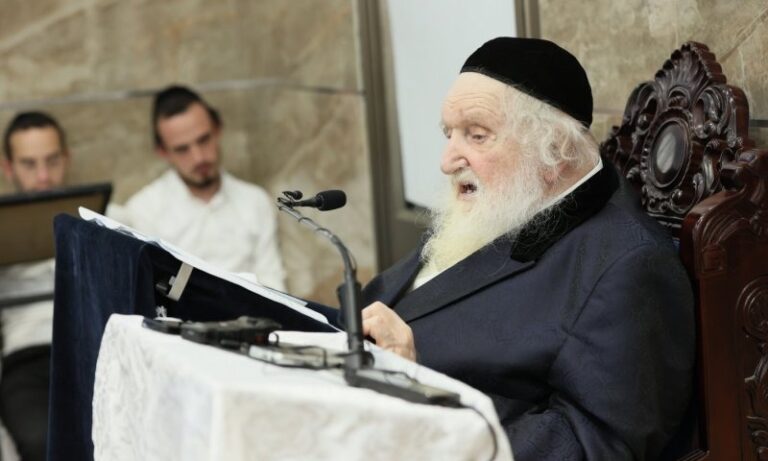 A teacher in the Orot Girl’s High School was fired over a dispute with the school’s principal over how the school’s dress code should be enforced.
A teacher in the Orot Girl’s High School was fired over a dispute with the school’s principal over how the school’s dress code should be enforced.
The parents of students last month received a letter from the teacher addressing the school’s dress code and how it is going to be enforced. A second letter was sent by the school informing parents the teacher is gone due to a dispute over the dress code issue.
One parents is quoted by the dati leumi Kippa website explaining “for years the teacher would stand by the entrance inspecting the girls as they entered”.
When asked why she was fired, the parent explained for one thing, she would check if the girl’s skirts are too short or their sleeves too short. In a good situation a student would be punished and in more severe situations sent home.
It is explained that the dati leumi system has been discussing the enforcement of modesty regulations for years and some are of the opinion that punishment will have a negative impact. The trend according to many is to bring the girl’s to the understanding of proper dress on their own without compelling it upon them.
It has been learned that the parents of 33 students of the teacher have sent a letter calling for her reinstatement. They applauded her teaching abilities and her interaction with students. They boast the accomplishment of their daughters in the teacher’s class and feel she is a valuable asset to the school, lauding her exceptional teaching skills. They sent the letter to the school’s principal, the mayor of Modi’in and the head of the Bnei Akiva school network. They suggest the teacher refrain from needles incidents, politely asking her to be less confrontational with the students over their dress.
After the school received the letter it met with parents and the decision was made to call the teacher to return.
The school will also review modesty standards in the coming weeks and the students will be informed they are expected to adhere to the dress code but failure to do so will not result in unusually harsh punishment of any kind. The parents explain they want their daughters to dress properly but not to be compelled by the use of unacceptable means of enforcement, but to reach the understanding of the importance of the issue of modesty on their own.
(YWN – Israel Desk, Jerusalem)











9 Responses
1. It’s unfair to treat the teacher vis-a-vis a particular issue based on how well she’s liked in other areas. It seems that if weren’t so popular she would not have been rehired, but what does that have to do with this particular issue.
2. Does the school not punish students for other infractions? E.g, if someone bring pork to school she’s just taught that it’s wrong? No? So why is tznius given a pass?
I wonder how the parents dress. If they dont follow the dress code, the students will NEVER come to do it on their own.
Does the Rav of your shul throw you out if (when?) he hears you speak Loshon Hara? And Loshon Hara has many more lavim and essas than tznius.
Whether you like it or not, we treat averos that a person is dosh b’akovov differently than averos that we are not dosh b’akovov. Pig, chillul Shabbos, and similar averos are so well kept that anyone who violates them clearly expresses their disregard for Torah. But other averos which are not so well kept (rightly or wrongly) do not express that same disregard, so we treat their infraction differently. We try to educate about them, not punish for them. That is just the way things are done. If we would punish for every avera done, none of us would live.
In some communities, the chomer of tznius is not understood as well as in other communities. We must take that into consideration when deciding how to deal with it.
Besides, the mitzvah of tochacha is to speak quietly and privately to the person and explain the severity of the inyan. If you publicly shame someone via tochacha you are oiver on the lav of “lo saamod al dam re’echa”. There are guidelines to tochacha. Look them up.
There is an intrinsic difference. Non-adherence to dress code usually indicates a lack of either knowledge or emunah or simple or rebellion. I have worked extensively with kids that have questions on yiddishkeit and the way that will definitely turn them completely off is punishing their call for help. The right attitude is to lovingly speak with them and try to understand what is happening in the child’s life.
should read “old” rebellion
There are many stories about how the Chofetz Chaim got people to do Teshuva just by poring his heart out to them. I heard one story about a Bachur that was caught being Michalel Shabbos. He was called into the Chofetz Chaim’s room and came out 15 minutes later in tears and resolved to never violate Shabbos again. The Bachur (who moved to Miami) revealed to a Rav that told over the story what happened in that room. He stated the Chofetz Chaim held his hand and started to weep and from time to time cry out softly, “shabbos… shabbos.” He did this for 15 minutes straight! The Bachur was so affected that he was chozer b’teshuva on the spot.
Chazal say, שמאל דוחה וימין מקרבת
I don’t know what the story was here but a school is entitled to have a dress code or a uniform regardless of halachic tznius requirements
#6
Those are from the storybooks
However there were countless times when he acted diametrically opposite
Harsh punishment pushes away rather than draws closer..